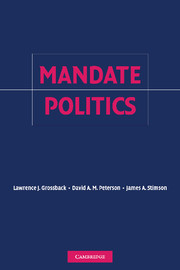Book contents
- Frontmatter
- Contents
- List of Figures
- List of Tables
- Preface
- Acknowledgments
- 1 A Single Time in a Single Place
- 2 The Evolution of Mandates
- 3 Members of Congress Respond
- 4 The Pattern of Congressional Response
- 5 Consequences
- 6 The Irresistible Meets the Unmovable
- 7 Conclusion: A Mandate View of Normal American Politics
- Bibliography
- Index
1 - A Single Time in a Single Place
Published online by Cambridge University Press: 14 August 2009
- Frontmatter
- Contents
- List of Figures
- List of Tables
- Preface
- Acknowledgments
- 1 A Single Time in a Single Place
- 2 The Evolution of Mandates
- 3 Members of Congress Respond
- 4 The Pattern of Congressional Response
- 5 Consequences
- 6 The Irresistible Meets the Unmovable
- 7 Conclusion: A Mandate View of Normal American Politics
- Bibliography
- Index
Summary
On the morning of November 5, 1964, Arthur Krock of the New York Times posed a problem for newly elected President Lyndon Johnson. How would he answer the “great question created by the most emphatic vote of preference ever given to a national candidate: How will he use the mandate to lead and govern that has been so overwhelmingly tendered by the American people?” (1964, p. 44). Krock's words capture the reaction of many to the landslide that had brought victory to more than Johnson. In the upcoming Congress, the Democrats would hold a two to one margin in both chambers. Thirty-eight new House Democrats extended their majority to 295 seats while two new Democratic Senators gave them a total of 68, the second largest majority the Democrats had ever held in both chambers (Morris 1965). If there ever was a partisan surge, this was it.
There was, as always, a debate over whether the Democratic surge constituted a mandate for Johnson's policies. Most Republicans attributed the defeat to the rejection of Barry Goldwater's brand of conservatism. Some Democrats argued that the victory was rooted more broadly in support of liberalism than in support of Johnson. There was some truth to this last notion. Outside the South, liberal Democrats replaced conservative Republicans. In the South, conservative Republicans replaced equally conservative Democrats. The liberal gains thus went beyond additional Democratic seats.
- Type
- Chapter
- Information
- Mandate Politics , pp. 1 - 26Publisher: Cambridge University PressPrint publication year: 2006



